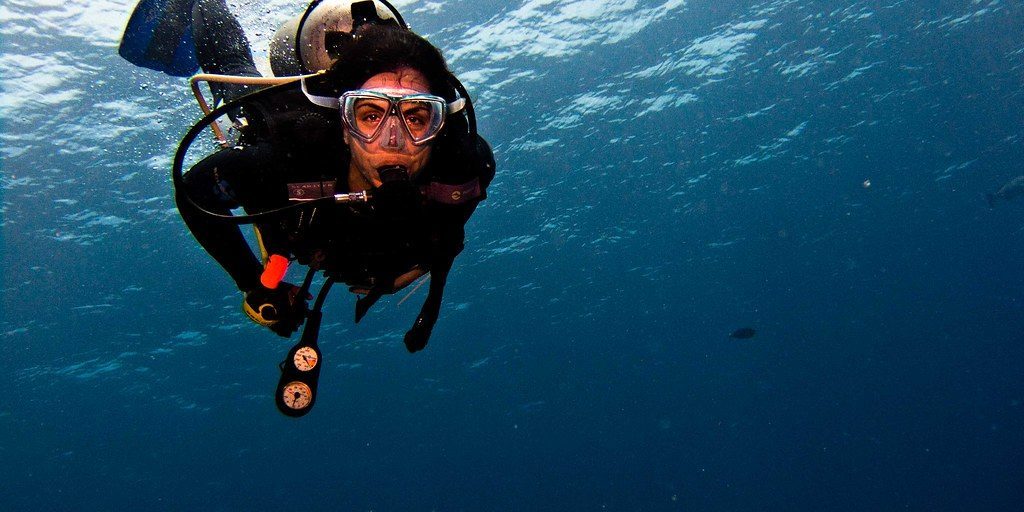On first thought, diving and earning a PhD may not seem to have much in common. But, the things that let you make a safe dive can also apply to keep you healthy, successful and earn your degree in time.
How can this be?
To dive safely, it is imperative to have no stress and not panic when you are under water. Many beginner divers spend too much time thinking about this, as if something does go wrong, it is most likely not an easy issue to fix. This is why divers spend their time before the dive preparing and making sure their equipment is in order, as well as that they feel ready themselves too.
You could say that to get your PhD, you also should not feel stress. When you are under stress, our brains do not function the way we want them to. What you need for your thesis is an empty, creative mind.
We all feel stress, there is nothing wrong with that. Stress in itself is not unhealthy per se, it is a physiological reaction of our body to difficult situations. But, too much stress or long-lasting stress will bring – as studies show – a fight or flight state of your body. And when you are in that state, you are unable to achieve as much as you would like, which only creates more stress. And then, if you are in this emergency mode too long, then you can cause damage to your brain – and that is just as scary as it sounds.
Therefore, it is really important to find a good way to manage your stress. These 12 rules used by divers can help you do this.
The 12 rules
1 Plan your dive and stick to the plan.
Plan your PhD and stick to it. If something does not work out, then don’t just change to other projects. Lay out a course of action, and set benchmarks to make sure you are on the right track. Not sure how to go about creating a plan? Here you’ll find some helpful tips.
2 Take a break and reevaluate.
Take breaks frequently. Review and reevaluate your PhD plan every three months. Does your plan still make sense? Has anything changed? Should you edit your current plan?
Also, take breaks throughout your day. Is it productive to be attending to your current task, or should you switch to something more beneficial? Should you discuss anything with anyone before continuing on?
3 Have a plan for every situation.
You never know exactly what’s going to happen during your PhD. Have you ever thought about what you would do if things don’t pan out the way you intend them to? Who can you turn to, and meet with if this does happen? Do you have a back-up plan? Have you thought about how to approach this with your mentor, what you would say in this scenario? If something goes wrong, how would you talk to your peers about it.
4 Practice your skills.
In your PhD program, you will run into many new things. Understand that because of this, you will need to learn many new skills. You might need to learn how to run experiments, work with SPSS, learn new software, respond to reviews, write academic articles, conduct interviews and give presentations. Understand that your new skills need practice to get perfect. Ask yourself if you might need more lessons or classes in this skill.
5 Do not rush yourself.
When diving, the water is unbelievably clear. If you head to the surface too quickly it can be deadly. You will not be going this speed in your PhD, yet the message is the same, don’t rush yourself. Take the time to think things out thoroughly and thoughtfully, don’t let yourself become scared, deadlines are handy, but not sacred. They don’t say “Haste makes waste” for nothing.
6 Be prepared.
If you have a consultation or meeting, be prepared. If you are compiling your data, be prepared, if you are going to write, be prepared, if you are going to go read, be prepared. Good preparation and forethought is half the work and can prevent stress.
7 Do not go over your limit when diving.
Not all PhD students take good care of themselves. They are workaholics and wear themselves out. Too long, too hard, too much.
Take breaks, go home on time, take time for yourself, take a vacation.
Get enough sleep, eat well, get some exercise. It sounds simple enough, but is not as easy as it sounds. Just make sure not to go over your own limit, it will only hurt yourself. No one can solve this for you, just you.
8 Know your equipment.
Know what type of material you are working with, what type of data, which instruments. But also, your peers, colleagues, mentors, teachers, learn their manners and how they like to work. And then, your own.
9 Look at the oxygen tank, how deep you want to go, and keep track of your diving time.
Basically: take care of yourself. What are your limits? What is good for you, what works, and what doesn’t? Learn to say no – an indispensable skill during your PhD.
10 Listen to your instincts.
Do you have a feeling that something isn’t right? Do you feel like something is going wrong? Listen to that gut feeling and find out if it is important.
11 SBTA – Stop, Breath, Think and Act
At the moment something does not go how you want it to, hoped it would, or thought it would, the chance is great that you will react impulsively. You might react angrily, or do something you will regret.
What should you do in this situation? Stop. Understand something went wrong. Take a couple of deep breaths. Think through what type of response you want to give. Most likely, this small pause and subsequent action will be much more productive than your first thought.
12 Make sure you always have a diving buddy.
Even for PhD students, this is essential. Make sure you always have a buddy, someone you can talk to, someone to discuss things with. A lot of PhD students feel alone, and then a PhD feels even longer. Make sure you have a friend to see it through with you. More than one is even better.




